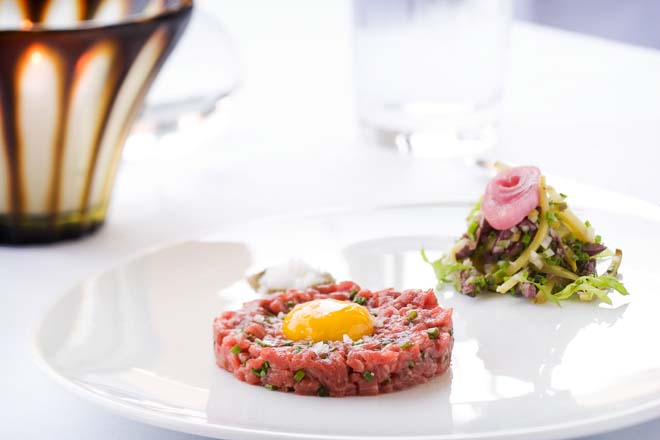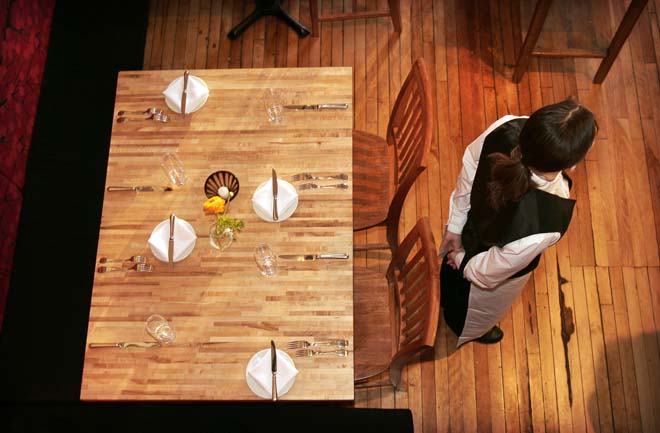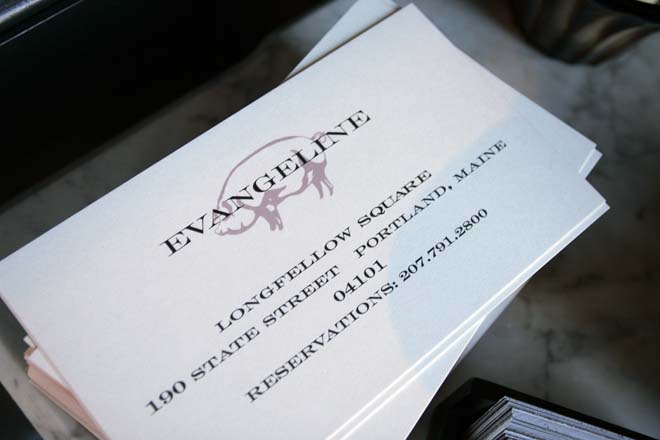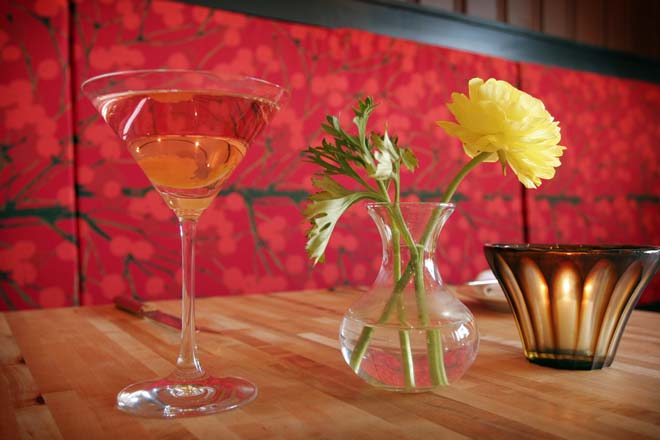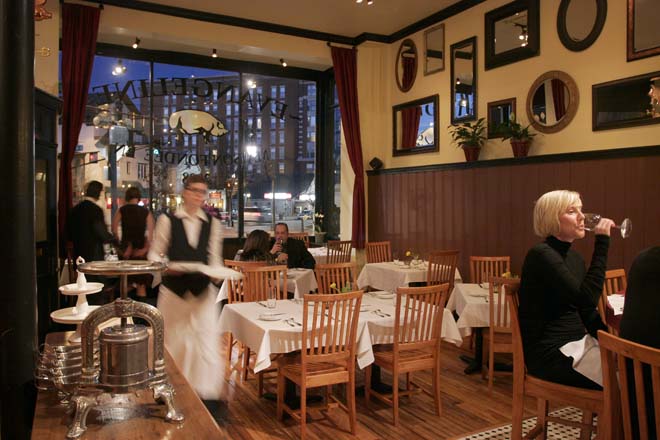Opening Evangeline
FEAST-June 2008 (from Maine Home+Design)
By Joshua Bodwell
Photographs by Irvin Serrano
April 17, 2008
2:50pm “Oh, you’re finally open for business!” says a well-dressed lady as she steps into the high-ceilinged dining room of Evangeline. “Finally!” agrees Captain Sean McClure, walking to greet her, the jacket of his pinstripe suit left hanging from a barstool across the room. McClure pencils her in for the following evening.
Fans of Chef Erik Desjarlais’s now-defunct Bandol and Ladle have been waiting months for the opening of his latest culinary venture. Anticipation grew as the eatery’s massive windows overlooking Longfellow Square in Portland were adorned with the image of a gluttonous golden pig. Le grand cochon is a fitting icon for a restaurant brimming with escargot, steak and moules frites, foie gras, and, of course, grenoullie—frog’s legs served with a sauce vert and nicoise flavors. Desjarlais’s gift is for making such delectables appealing to the American palette.
3:00pm Wine steward Joe Ricchio strides in and almost immediately snatches the ringing phone from its cradle. “That’s another one for tonight,” he calls out, hanging up the phone.
“Don’t take any more at 7:30!” says McClure. “And don’t book more than six tables every half hour!” Desjarlais, bright-eyed and flush, pokes his head from the steamy kitchen and seconds McClure’s assertion.
In the kitchen, Desjarlais, with short-cropped hair and bands of tattoos creeping down his forearms, is busy prepping. The 31-year-old chef and his kitchen staff handle the food with a mix of familiarity and tenderness. The kitchen is suffused with an air of confidence and control, but there is also an undercurrent of unease, as if it could all collapse at any moment. Still, laughter can be heard as they prep and share stories, and curses fly jovially around the room.
Ricchio and McClure convene at the bar and discuss the prior evening’s “extremely soft opening,” when the staff served about twenty-five of Desjarlais’s close friends. Guests were treated to items destined for Evangeline’s first menu. The meal included mushroom veloute, a soup of foraged mushrooms with duxelles and almond cream; salade vert with mache and pissenlit (lamb’s lettuce and dandelion greens), and a fried duck’s egg. The crispy calf’s brain was served with melted leeks, beurre noisette, capers, and lardons. Main courses included a cod filet brandade with olives and sweet peppers, saba, and aubergine caviar, as well as porc with a thick gastrique sauce, paired with pickled vegetables and beans cassoulet served in a tiny blue Le Creuset pot. Some finished with a lemon tart in a hazelnut crust and topped with crème fraîche, others with dark chocolate mousse and Cara Cara orange granita.
3:10pm The waitstaff trickle in wearing pressed black slacks and crisp white shirts. Ricchio hands out trim black vests, joking with one waiter: “Are you a femme or a homme?”
3:15pm “Ay, how’d it go last night?” asks the wine delivery guy dressed in jeans and a red, sleeveless t-shirt. He is met with cheers.
Ricchio and McClure slaved over Evangeline’s wine selection and eventually compiled a list totaling 200; many are available by the glass. While the list is devoid of Italian wines, there are five from Catalonia—the northeastern region of Spain loved by Desjarlais’s fiancée, Krista Kern, the owner of Bresca. France’s Bandol region is represented in half a dozen selections, including Domaine Tempier’s rosé, blanc, and rouge.
3:25pm Outside, a bored crossing guard paces the intersection of Congress and State streets; her bright-red lollipop sign leans against a telephone pole. Behind her, perched ten feet in the air, sits a statue of the poet Henry Wadsworth Longfellow.
Back inside, behind the long red bar, the bartender dumps a bucket of ice into the cooler.
3:35pm Desjarlais sets out a platter of cheeses to come up to room temperature.
3:45pm More waitstaff arrives. More wine arrives. Flowers arrive with a little card: “Good Luck!”
Then, quite abruptly, the tone of the afternoon changes. There is less talk as heads drop to their tasks: brooms, vacuums, and cloths come out, and every surface in reach gets the once over. Someone turns on the stereo and the dining room fills with a Parisian jam. Ricchio disappears, only to reappear moments later in a suit and shiny leather boots, trying to bum a smoke from the kitchen staff. “Where are the candles?” asks a waitress. No one is sure.
4:15pm The kitchen is warm. Desjarlais slurps from a little Mott’s apple juice box. He begins preparing the long stainless-steel table at the kitchen’s center for the evening. He meticulously folds towels and lays several blue-enameled trivets atop them. He lines up an arsenal of salts, peppers, and little bottles of various oils. He wipes and rewipes the area constantly. Above him hangs a cache of 8-inch All-Clad pans.
4:25pm Desjarlais pulls out a laptop and makes his final changes to the evening’s menu.
At the far end of the table, sous chef Mitch Gerow whacks out a pile of lardons with a wood-handled cleaver. Across the room, pastry chef Peter Zinn smoothes the tops of lemon tarts with a tiny palette knife.
“Hey, Peter,” jokes Desjarlais, “how do you say ‘dessert’ in French?”
“Les dessert,” deadpans Zinn.
4:45pm Ricchio gathers the front-of-house staff and explains the region, nose, and dominant taste of each new wine. The waitstaff scribbles notes on tiny pads.
5:05pm Desjarlais finishes the menu and hands the pages to McClure as they come off the printer. Ricchio slips the sheets into the leather menu holders, as McClure walks the waitstaff through each dish. It is the moment when, suddenly, the front-of-house and back-of-house come crashing gleefully together for the first time all afternoon.
5:15pm “Everyone feeling good?” asks Desjarlais from the kitchen door. He is met with smiles and nods.
5:28pm “We are live,” announces Ricchio to the kitchen. Two minutes before Evangeline’s official opening time, a couple has arrived.
“Is this a walk-in?” asks Desjarlais as Ricchio turns to leave. “Joe,” he says again, anxiously, “Is this a walk-in?”
“Yes,” Ricchio answers calmly.
Desjarlais turns back and surveys the kitchen. He pulls a slim, modern vacuum from the wall and makes one last pass over the commercial rugs, then bends and carefully squares each rug to the tile lines. “Are we open yet?” he asks Gerow with a grin.
5:45pm As more guests arrive, the first order of the evening appears in the kitchen. The appetizers go out immediately: escargot (served with a garlic-marrow emulsion and shaved Reggiano) and oyster and leek bisque (poached oysters and leeks served with American caviar).
6:10pm The call comes to pick up the first main courses of the night: porc and poulet—a roasted and braised air-chilled chicken with sauce moutarde and tarragon glazed vegetables.
“This is it,” says Desjarlais with a grin and a slightly wild look in his eyes. “It’s like jumping off a building!”
“No,” he answers in response to a question about whether he is equipped with a parachute for the jump. “It’s more like there are firefighters at the bottom with one of those big, round trampoline things!”
This is an honest admission: when you dare to leap from great heights, you never know if you are going to make it.
6:15pm There are fifteen reservations on the books already. With seating for just twenty-eight on the floor and another ten at the bar, walk-ins have been arriving steadily.
Outside, the sun is waning. Long shadows arch across the statue of Longfellow.
It was more than 160 years ago that Longfellow penned his first epic poem. It was the story of an Acadian woman named Evangeline and her devotion to her beloved. “This is the forest primeval” the poem begins. “The murmuring pines and the hemlocks, bearded with moss, and in garments green, indistinct in the twilight…”






